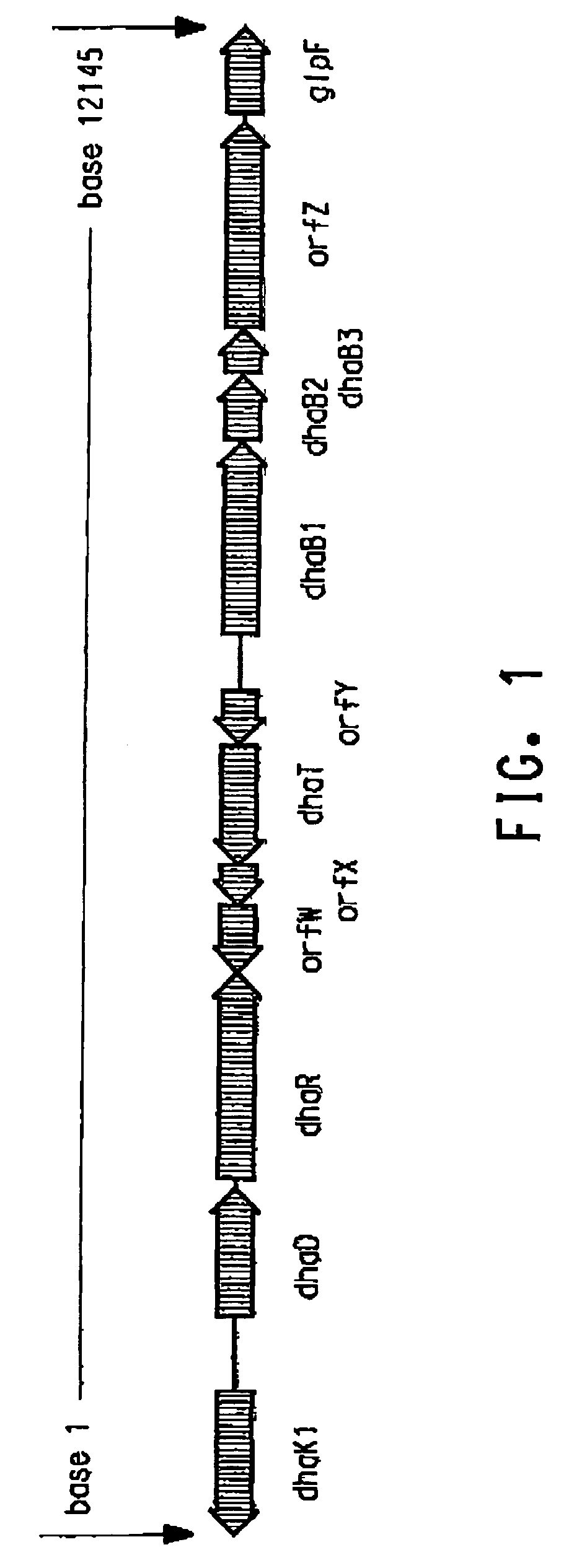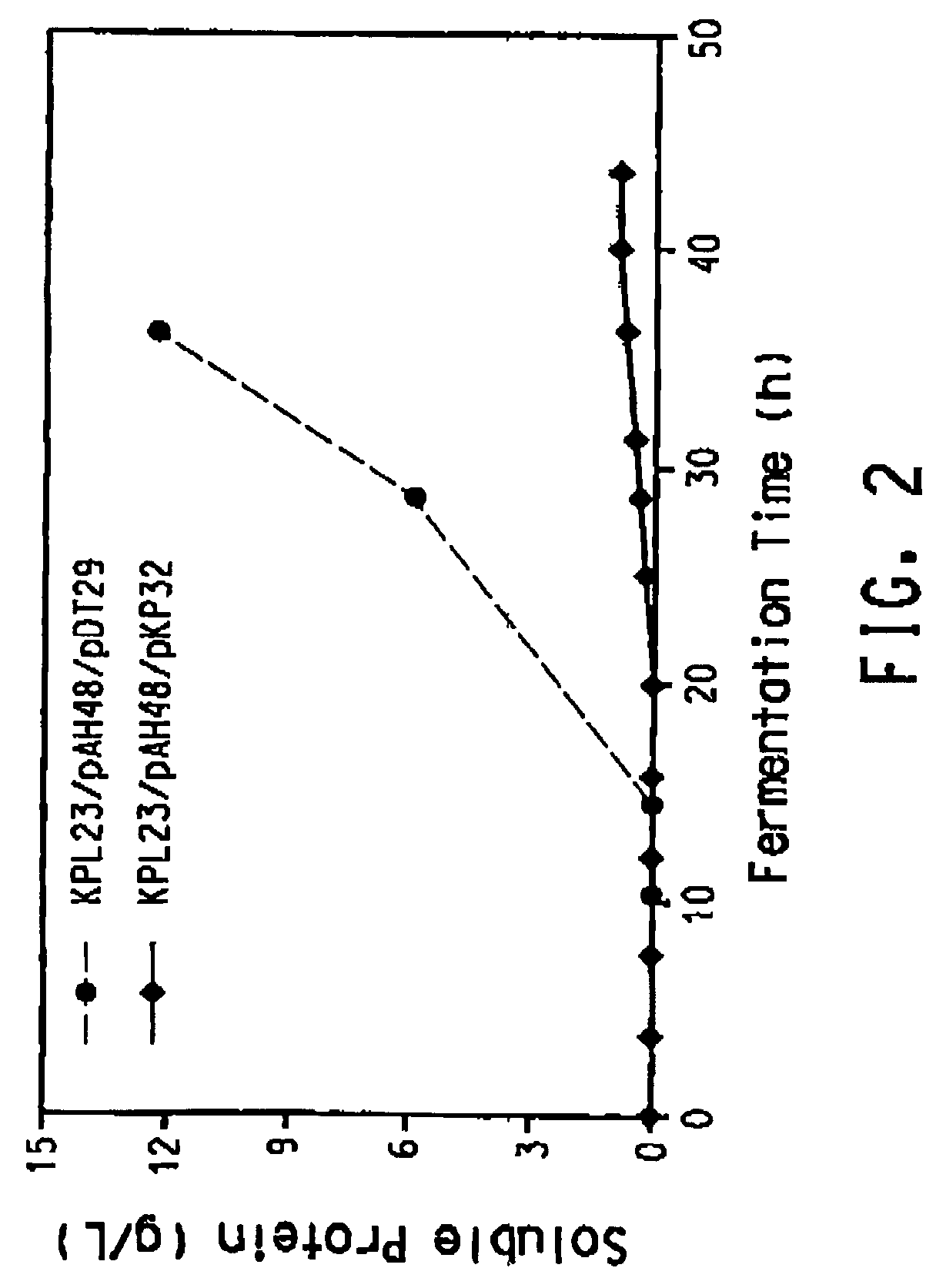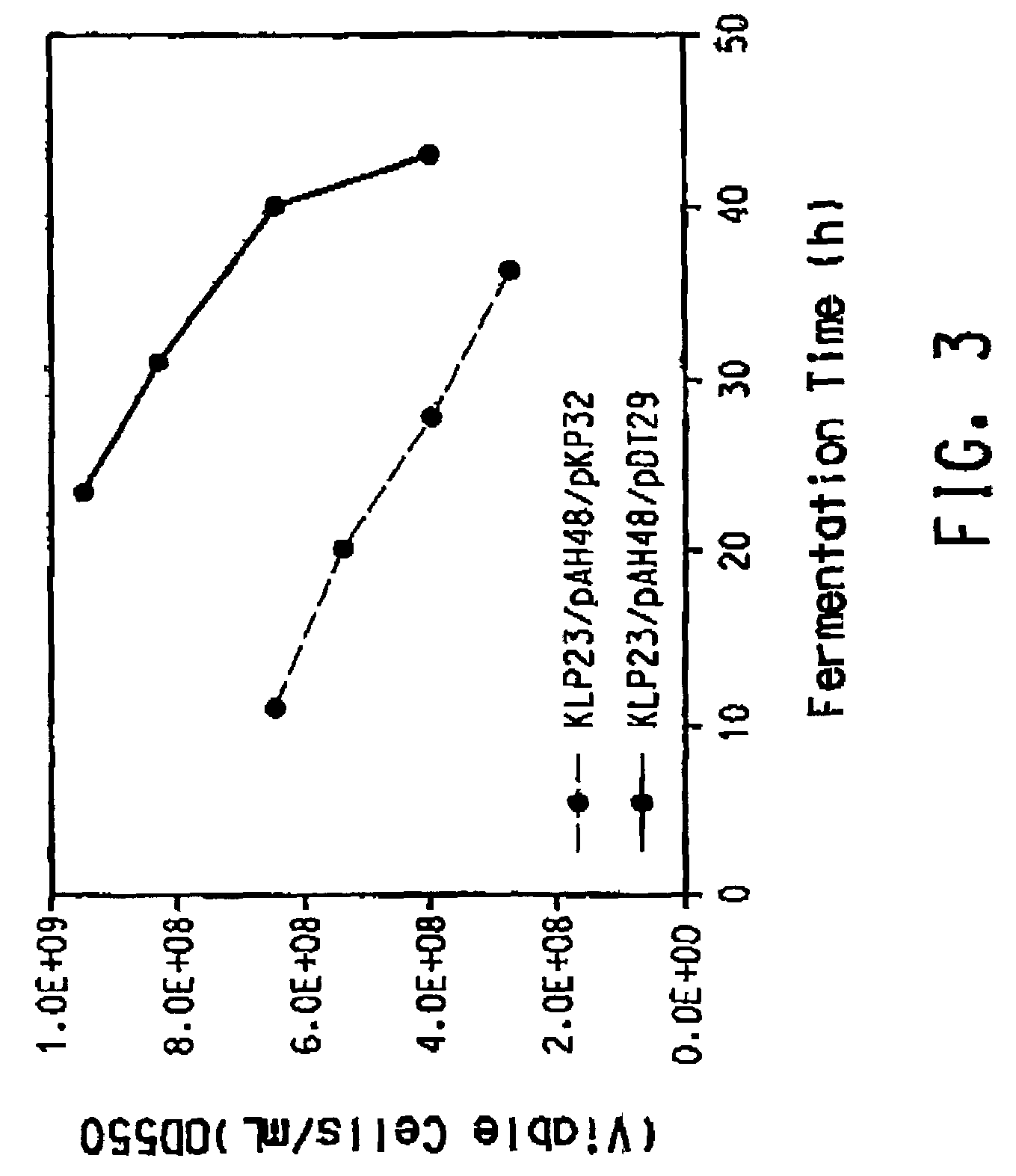Process for the biological production of 1,3-propanediol with high titer
a technology of 1,3-propanediol and biological production, which is applied in the field of biological production of 1,3-propanediol with high titer, can solve the problems of less efficient kinetic parameters, limited methods, and waste streams containing environmental pollutants, and achieves the effects of improving economics, improving the process for the production of 1,3-propanediol from glucose, and high titer
- Summary
- Abstract
- Description
- Claims
- Application Information
AI Technical Summary
Benefits of technology
Problems solved by technology
Method used
Image
Examples
example 1
Cloning and Transformation of E. coli Host Cells with Cosmid DNA for the Expression of 1,3-propanediol
Media:
[0185]Synthetic S12 medium was used in the screening of bacterial transformants for the ability to make 1,3-propanediol. S12 medium contains: 10 mM ammonium sulfate, 50 mM potassium phosphate buffer, pH 7.0, 2 mM MgCl2, 0.7 mM CaCl2, 50 μM MnCl2, 1 μM FeCl3, 1 μM ZnCl, 1.7 μM CuSO4, 2.5 μM CoCl2, 2.4 μM Na2MoO4, and 2 μM thiamine hydrochloride.
[0186]Medium A used for growth and fermentation consisted of: 10 mM ammonium sulfate; 50 mM MOPS / KOH buffer, pH 7.5; 5 mM potassium phosphate buffer, pH 7.5; 2 mM MgCl2; 0.7 mM CaCl2; 50 μM MnCl2; 1 μM FeCl3; 1 μM ZnCl; 1.72 μM CuSO4; 2.53 μM CoCl2; 2.42 μM Na2MoO4; 2 μM thiamine hydrochloride; 0.01% yeast extract; 0.01% casamino acids; 0.8 μg / mL vitamin B12; and 50 μg / mL amp. Medium A was supplemented with either 0.2% glycerol or 0.2% glycerol plus 0.2% D-glucose as required.
Cells:
[0187]Klebsiella pneumoniae ECL2106 (Ruch et al., J. Bac...
example 2
Engineering of Glycerol Kinase Mutants of E. coli FM5 for Production of Glycerol from Glucose
Construction of Integration Plasmid for Glycerol Kinase Gene Replacement in E. coli FM5:
[0202]E. coli FM5 (ATCC 53911) genomic DNA was prepared using the Puregene DNA Isolation Kit (Gentra Systems, Minneapolis, MN). A 1.0 kb DNA fragment containing partial glpF and glycerol kinase (glpK) genes was amplified by PCR (Mullis and Faloona, Methods Enzymol. 155, 335 (1987)) from FM5 genomic DNA using primers SEQ ID NO:2 and SEQ ID NO:3. A 1.1 kb DNA fragment containing partial glpK and glpX genes was amplified by PCR from FM5 genomic DNA using primers SEQ ID NO:4 and SEQ ID NO:5. A MunI site was incorporated into primer SEQ ID NO:4. The 5′ end of primer SEQ ID NO:4 was the reverse complement of primer SEQ ID NO:3 to enable subsequent overlap extension PCR. The gene splicing by overlap extension technique (Horton et al., BioTechniques 8, 528 (1990)) was used to generate a 2.1 kb fragment by PCR usi...
example 3
Construction of E. coli Strain with gldA Gene Knockout
[0206]The gldA gene was isolated from E. coli by PCR (K. B. Mullis and F. A. Faloona, Meth. Enzymol. 155, 335–350 (1987)) using primers SEQ ID NO:12 and SEQ ID NO:13, which incorporate terminal Sph1 and Xba1 sites, respectively, and cloned (T. Maniatis (1982) Molecular Cloning: A Laboratory Manual. Cold Spring Harbor, Cold Spring Harbor, N.Y.) between the Sph1 and Xba1 sites in pUC18, to generate pKP8. pKP8 was cut at the unique Sal1 and Nco1 sites within the gldA gene, the ends flushed with Klenow and religated, resulting in a 109 bp deletion in the middle of gldA and regeneration of a unique Sal1 site, to generate pKP9. A 1.4 kb DNA fragment containing the gene conferring kanamycin resistance (kan), and including about 400 bps of DNA upstream of the translational start codon and about 100 bps of DNA downstream of the translational stop codon, was isolated from pET-28a(+) (Novagen, Madison, Wis.) by PCR using primers SEQ ID NO:1...
PUM
 Login to View More
Login to View More Abstract
Description
Claims
Application Information
 Login to View More
Login to View More - R&D
- Intellectual Property
- Life Sciences
- Materials
- Tech Scout
- Unparalleled Data Quality
- Higher Quality Content
- 60% Fewer Hallucinations
Browse by: Latest US Patents, China's latest patents, Technical Efficacy Thesaurus, Application Domain, Technology Topic, Popular Technical Reports.
© 2025 PatSnap. All rights reserved.Legal|Privacy policy|Modern Slavery Act Transparency Statement|Sitemap|About US| Contact US: help@patsnap.com



